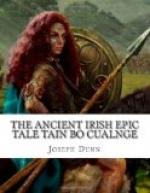[a] The LU. version of this
episode was given above under XIIe, page
143.
[1-1] Stowe.
[2-2] Eg. 93 and H. 2. 17.
[3-3] Eg. 93.
Touching Cuchulain, he remained in his sound, heavy sleep till the end of three days and three nights at the ‘Gravemound on the Slopes.’ Thereafter Cuchulain arose from his sleep. He passed his hand over his face and he became as a wild[b] wheel-thunder (?) from his crown to the ground, and he felt his courage strengthened, and he would have [W.2497.] been able to go into an assembly or on a march or to a tryst with a woman or to an ale-house or into one of the chief assemblies of Erin. “How long am I asleep now, young warrior?” Cuchulain asked. “Three days and three nights,” the young warrior made answer. “Woe is me for that!” quoth Cuchulain. “Why so?” asked the young warrior. “For that the hosts have not been attacked in that time,” answered Cuchulain. “Nay, not so were they spared,” the young warrior made answer. “I would fain inquire who then attacked them?” Cuchulain asked. “The youths came hither out of the north from Emain Macha, thrice fifty boys accompanying Follomain, Conchobar’s son, and they the sons of the kings of Ulster. And three battles they offered the hosts in the space of the three days and three nights wherein thou wast till now asleep, and thrice their number are fallen at their hands and the youths themselves are fallen except Follomain [1]alone,[1] Conchobar’s son. And Follomain vowed that never till the very day of doom and of life [3]would he return [2]north[2] to Emain Macha till he carried off Ailill’s head with the diadem of gold which was on it. Howbeit not such was his luck, for he fell at the hands of the two sons of Bethe son of Ban, after engaging in battle with them."[3]
[b] Literally, ‘crimson.’
[1-1] Eg. 93.
[2-2] Eg. 93 and H. 2. 17.
[3-3] Stowe.
“Alas, that I was not [4]there[4] in my strength!” cried Cuchulain; “for had I been in my strength the youths would not have fallen, as now they have, and Follomain would not have perished.” “But this avow, O Cucan,"[a] [5]said the young warrior;[5] “it is no reproach to thine honour and no disgrace to thy valour.” “Bide here this night with us, young warrior,” said Cuchulain, “that together we avenge the youths on the hosts.” “Nay then, I may not tarry,” answered the [W.2515.] young warrior. [1]"Why so?” asked Cuchulain. “Easy to say,” replied the young warrior;[1] “for however prodigious the deeds of valour and skill in arms one may perform in thy company, not on him will fall the glory nor the honour nor the fame but on thyself. For this reason will I not tarry with thee, but do thou thyself try thy feats of arms [2]and the strength of thy hands[2] alone on the hosts, for not with them is the power over thy life on this occasion.”




